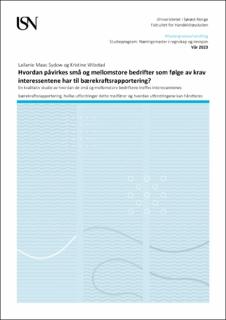| dc.contributor.advisor | Baksaas, Kjell Magne | |
| dc.contributor.author | Wibstad, Kristine | |
| dc.contributor.author | Sydow, Lailanie Maac | |
| dc.date.accessioned | 2023-11-10T10:35:16Z | |
| dc.date.available | 2023-11-10T10:35:16Z | |
| dc.date.issued | 2023 | |
| dc.identifier | no.usn:wiseflow:6825686:55011106 | |
| dc.identifier.uri | https://hdl.handle.net/11250/3101834 | |
| dc.description.abstract | Formålet med utredningen har vært å oppnå forståelse for hvordan små og mellomstore bedrifter påvirkes som følge av interessentenes krav til bærekraftsrapportering. Vi har tatt utgangspunkt i et interessentperspektiv og undersøkt hvordan små og mellomstore bedriftene påvirkes indirekte av de nye regelverkene for bærekraftsrapportering gjennom interessenter. Videre har vi utforsket hvilke utfordringer og risikoer dette medfører for de små og mellomstore bedriftene og til sist har vi undersøkt hvorvidt det finnes løsninger på disse utfordringene. I studien har vi både hatt et fokus på regelverk som allerede er trådt i kraft og regelverk som er vedtatt, men ikke trådt i kraft per våren 2023. Vi har begrenset studien til norske små og mellomstore bedrifter.
For å oppnå studiens formål har vi funnet det hensiktsmessig å foreta en kvalitativ studie, basert på et eksplorerende forskningsdesign. Vi har benyttet en stratifisert utvalgsstrategi og har utført 12 semistrukturerte intervjuer av informanter fra store selskaper, banker og fagpersoner på området. Deretter har vi valgt personer fra de ulike gruppene basert på hensiktsmessighet. Hensiktsmessighet benyttes for å sikre informantens relevans til vår undersøkelse. Alle informantene tilhører norske foretak og har bred erfaring knyttet til bærekraftsrapportering.
I studien finner vi at de små og mellomstore bedriftene allerede blir påvirket av de store selskapene og bankenes bærekraftsrapportering. Det er i hovedsak informasjonskrav, men også enkelte krav til bærekraftige leveranser og miljøsertifiseringer. Disse informasjonskravene mot små og mellomstore bedrifter har økt i omfang som følge av åpenhetsloven og det forventes en vesentlig økning i omfang i forbindelse med innføringen av Corporate Sustainability Reporting Directive, CSRD, fra 2024. Vi har funnet at omfattende informasjonskrav og manglende standardisering er hovedutfordringene som små og mellomstore bedrifter står overfor som følge av de nye regelverkene. Begge utfordringene har sammenheng med små og mellomstore bedrifters manglende ressurser til å bruke på bærekraftsarbeid. Manglende oppfyllelse av krav og forventninger kan potensielt medføre alvorlige konsekvenser for små og mellomstore bedrifter, blant annet svekket konkurranseevne og redusert tilgang på finansiering. For å håndtere disse utfordringene og minimere risikoene knyttet til interessentenes bærekraftsrapportering, ble det foreslått bistand fra bransjeorganisasjoner, bistand fra andre interessenter og standardisering gjennom forenklede standarder for bærekraftsrapportering. | |
| dc.description.abstract | The purpose of the study has been to gain an understanding of how small and medium-sized entities in Norway are affected by the sustainability reporting of their stakeholders. We have taken a stakeholder perspective and explored how small and medium-sized entities are indirectly being affected by sustainability regulations through their stakeholders. Furthermore, we have explored potential challenges and risks this may lead to for the small and medium-sized entities. The last question we have explored is whether there are any potential solutions to these challenges. We have considered the regulations that have been taken into effect, but also the regulations that have been adopted yet not taken into effect as of spring 2023. We have limited our study to small and medium sized enterprises in Norway.
To achieve the purpose of the study, we have found it appropriate to undertake a qualitative study, based on an explorative research design. We have used a stratified sampling method and have executed 12 semi-structured interviews of informants from large companies, banks, and key professionals. Then we selected persons from the different groups, based on appropriateness, to secure the relevance of the informants to our study. All the informants belong to Norwegian entities and have a wide experience related to sustainability and sustainability reporting.
We found that small and medium-sized enterprises are already being affected by the sustainability reporting of their stakeholders. These stakeholders demand information on sustainability, but in some cases sustainable products and environmental certifications as well. The information requirements have increased in scope because of “åpenhetsloven”, and it is expected a significant increase in scope due to the introduction of CSRD, from 2024. We have found that extensive information requirements and the lack of standardization are the main challenges that small and medium-sized enterprises face because of these new regulations. Both challenges are related to the lack of resources to use on sustainability in their daily operations. Lack of ability to meet the information demands and expectations may lead to serious consequences for the small and medium-sized entities, for example weakened ability to compete in the market and reduced access to finance. To handle these challenges and minimize the risk related to the sustainability reporting of the stakeholders, our study suggests assistance from trade associations, collaboration with other stakeholders and standardization through simplified standards for sustainability reporting. | |
| dc.language | nob | |
| dc.publisher | University of South-Eastern Norway | |
| dc.title | Hvordan påvirkes små og mellomstore bedrifter som følge av krav interessentene har til bærekraftsrapportering? | |
| dc.type | Master thesis | |


